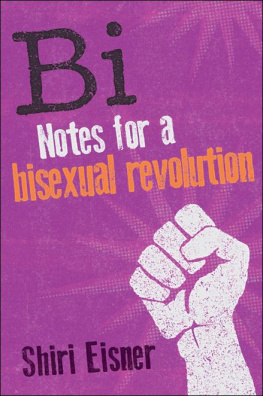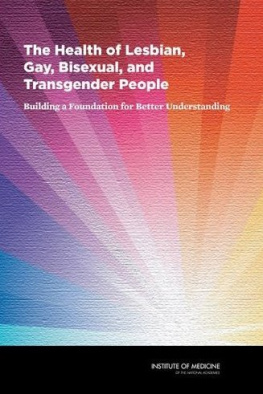Claiming the B in LGBT
Illuminating the Bisexual Narrative
Kate Harrad

Claiming the B in LGBT
Illuminating the Bisexual Narrative
Text copyright 2018 by Kate Harrad
Image copyrights 2016 by the individual contributors
Foreword copyright 2018 by H. Sharif Williams
Originally published in the United Kingdom as Purple Prose: Bisexuality in Britain 2016
All rights reserved. No part of this book may be used or reproduced in any manner whatsoever without written permission from the publisher except in the case of brief quotations in critical articles and reviews.
Thorntree Press, LLC
PO Box 301231
Portland, OR 97294
press@thorntreepress.com
Cover and interior design by Jeff Werner
Editing by Roma Ilnyckyj
Proofreading by Roma Ilnyckyj and Hazel Boydell
Thorntree Presss activities take place on traditional and ancestral lands of the Coast Salish people, including the Chinook, Musqueam, Squamish and Tsleil-Waututh nations.
Library of Congress Cataloging-in-Publication Data
Names: Harrad, Kate, editor.
Title: Claiming the B in LGBT : illuminating the bisexual narrative / edited by Kate Harrad [and 11others]; foreword by H. Sharif Williams.
Description: Portland, Oregon : Thorntree Press, 2018. |
Identifiers: LCCN 2018018136 (print) | LCCN 2018020184 (ebook) |
ISBN 9781944934613 (epub) | ISBN 9781944934620 (mobipocket) |
ISBN 9781944934637 ( pdf) | ISBN 9781944934606 (paperback)
Subjects: LCSH: Bisexuality--United States. | Bisexuals--United States. |
Group identity--United States. | BISAC: FAMILY & RELATIONSHIPS / Love & Romance.
Classification: LCC HQ74.2.U55 (ebook) | LCC HQ74.2.U55 H37 2018 (print) | DDC 306.76/50973--dc23
LC record available at https://lccn.loc.gov/2018018136
Digital edition v1.0
editor: kate harrad
Individual chapter editors:
Jacq Applebee
Meg-John Barker
Elizabeth Baxter-Williams
Jamie Q Collins
Grant Denkinson
Kate Harrad
Symon Hill
Juliet Kemp
Fred Langridge
Marcus Morgan
Kaye McLelland
Milena Popova
Foreword
By H. Herukhuti Sharif Williams
Im not an Anglophile. I dont follow developments in the British royal family, Germans by ancestry, or think that a British accent sounds more important, educated, or classy than any other. The United States obsession with all things British and the special relationship that it has with our former colonial government runs afoul of the antagonistic relationship I have with settler-colonialism and imperialism.
But in 2010, I accepted an invitation from rukus! Federation, an artist-led charity founded in 2000 by Ajamu Ikwe-Tyehimba and Topher Campbell, to read from my book Conjuring Black Funk: Notes on Culture, Sexuality, and Spirituality, Volume 1 (Vintage Entity Press, 2007) at Lambert Councils Brixton Library. It was my first book and first attempt at articulating Black bisexual aesthetics and politics in book form. I was honored to have two Black gay men all the way in the UK think that I had something to offer Black LGBTQIA folks over there.
The relationship between Black bisexual and gay men in the United States has been complicated. We have been involved with and contributed to queer culture. We have been friends and lovers. But Black bisexual men have been subject to the erasure of our sexual fluidity through misorientation as gay or straight. Gay men have engaged in this erasure and misorientation and made it harder for us to identify, appreciate and honor our history, ancestors and elders. Thats why the average Black bisexual man has no idea that Khnumhotep, Niankhkhnum, Leslie Hutch Hutchinson, Countee Cullen, El Hajj Malik el-Shabazz (Malcolm X), James Baldwin, Emile Griffith and Alvin Ailey are our Black bisexual male ancestors.
Many gay men carry stories of traumatic relationships with bisexual men that have left longstanding emotional wounds. But unlike unhealthy relationships with other gay men, some gay men blame the sexuality of their bisexual partners for the problems and traumas in their relationships. It couldnt be that the partners or the relationships were problematic; bisexuality must be the root cause of their downfall. The inherent biphobia in these attributions has contributed to barriers to intimacy, trust and love between many bisexual and gay men. I am glad to have overcome those barriers with many gay men.
I had been developing a friendship with Ajamu for several years by the time I was invited to read. Steven G. Fullwood, my publisher and great friend, had been working with Ajamu and brought him to the Workshop, a decolonizing sex party for men of African descent I organized in the early 2000s. Topher came to the States regularly, but he and I had only met once or twice. Our encounters always felt pleasant, but formal and distant.
I chose a non-traditional format for my readings on the book tour. Someone would introduce me and ask me a set of prepared questions, and I would weave reading from the book with answers to the questions. Ajamu decided Topher would MC. Of course, I would have felt more at ease sharing the stage with Ajamu, not only because of our emerging relationship but also because Ajamu, fellow kinkster/ BDSM Master, was as much of a trickster and comedian as I was. There was no formality or reserve between us, which I thought would make for an entertaining performance.
Regardless of the earlier formality, as we settled into the event, I began to feel not only Tophers warmth but also the care with which he was holding the space for us as an MC. I realized the ways in which Topher and Ajamu complemented each other as a team and the great love and respect they shared. They reminded me of Steven and me, except that ours was a friendship and collaboration between a Black gay man and a Black bisexual man.
I was born and raised in Brooklyn, and Brixton reminded me so much of home: the familiar sights, sounds and smells of Caribbean culture. An eclectic mix of Black folksdifferent ages, hues, genders and hair textures/colorsgathered that day in the library. Their energy was seismic, reaching me and Topher on the risers the library staff had set up for us in the childrens reading area. It was wonderfully transgressive to temporarily claim the space to talk about the relationship culture, sex and spirituality can have while surrounded by all the materials librarians use to build an inviting space for young readers: posters, childrens books and brightly colored craft products made by young people.
Coming to know ones sexual self can be quite like the journey to develop a reader identity. Having spaces and resources that touch you in familiar ways while simultaneously opening you up to worlds previously unknown to you can be inspirational and grounding. The experience of coming to know oneself in both ways can feel like flying unrestrained by the limitations of imposed norms and values. And it can be so comforting to notice an aspect of oneself in anothers story or reality and know youre not alone. These resources can be invaluable learning aids in the development of sexual personhood and reader identity.
That is the work of this text, Claiming the B in LGBT . It is a collection of bi+ people living in the UK describing the nature of sexual fluidity on their terms. As US readers, we have the opportunity to bear witness to how non-monosexual reality operates outside of our North American bubble. Although the UK has had its own LGBT movement, the US has been ground zero for the global LGBT movement. The US has exported its brand of queerness to many parts of the world: a brand of queerness that is rooted in whiteness, neoliberalism, consumerism, homonormativity, the fetishization of youthfulness and body fascism. American queer colonialism and imperialism has set standards for being LGBT throughout the world, thereby obscuring, marginalizing, and/or invisibilizing indigenous forms of queerness. It is great to have another countrys understanding of queerness presented to us for our consideration.


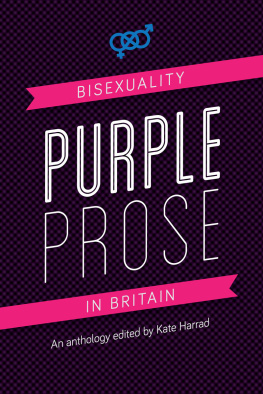
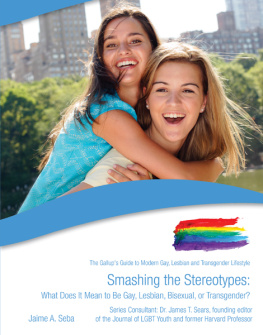
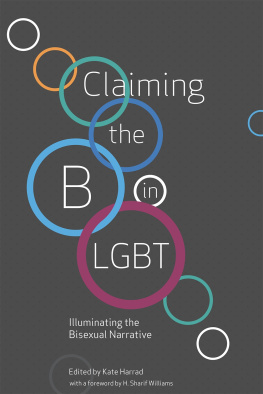
![Chuck Stewart - Lesbian, Gay, Bisexual, and Transgender Americans at Risk [3 Volumes]: Problems and Solutions](/uploads/posts/book/129596/thumbs/chuck-stewart-lesbian-gay-bisexual-and.jpg)
